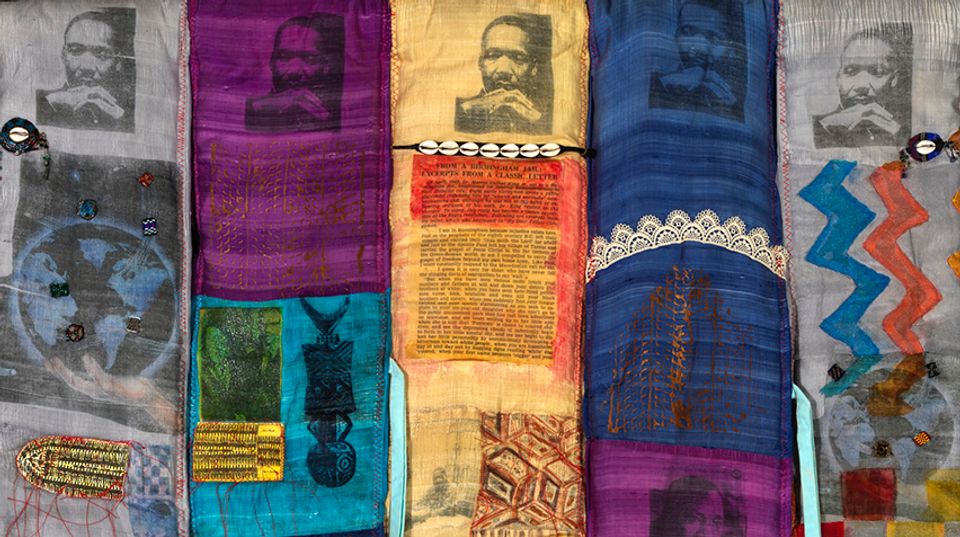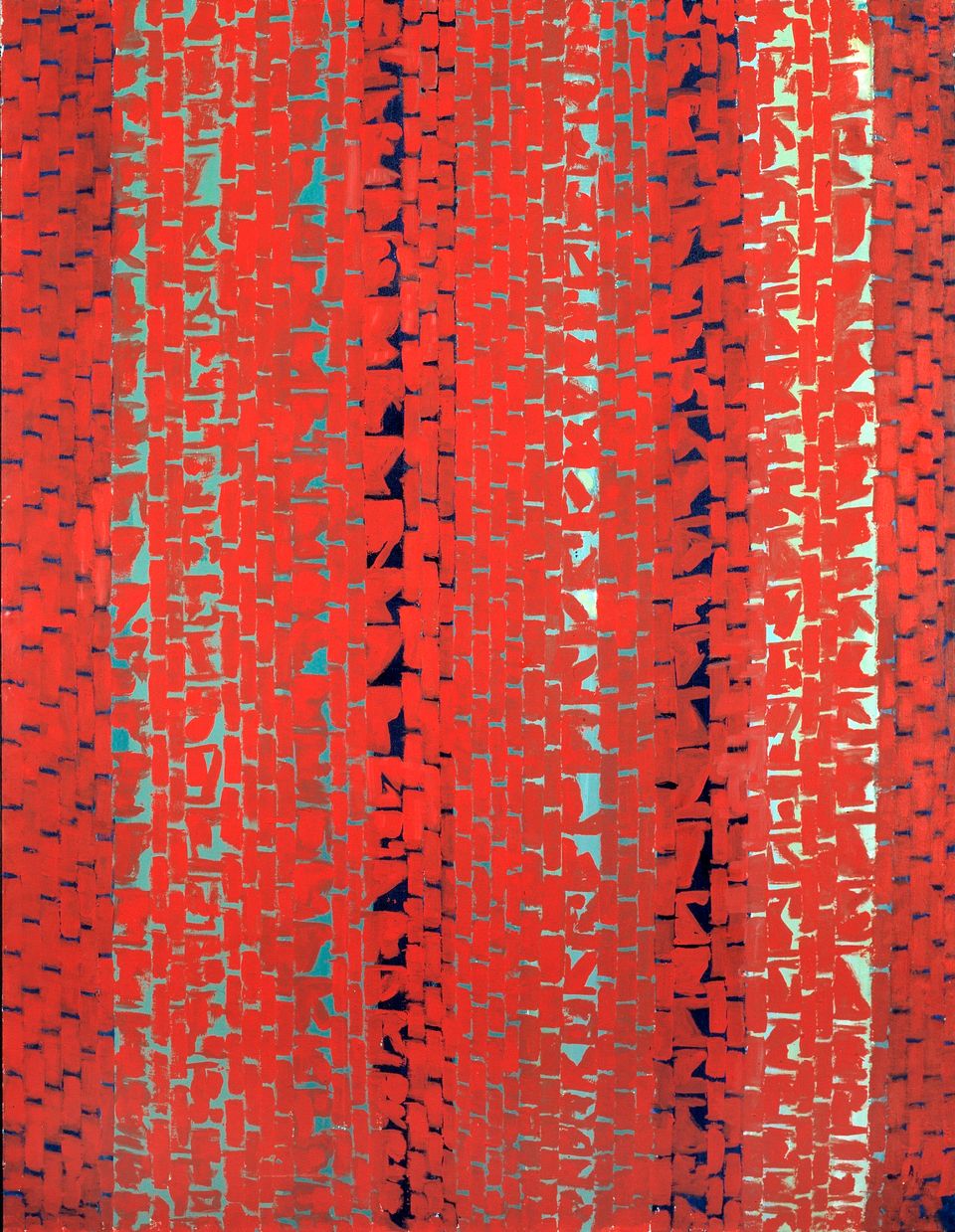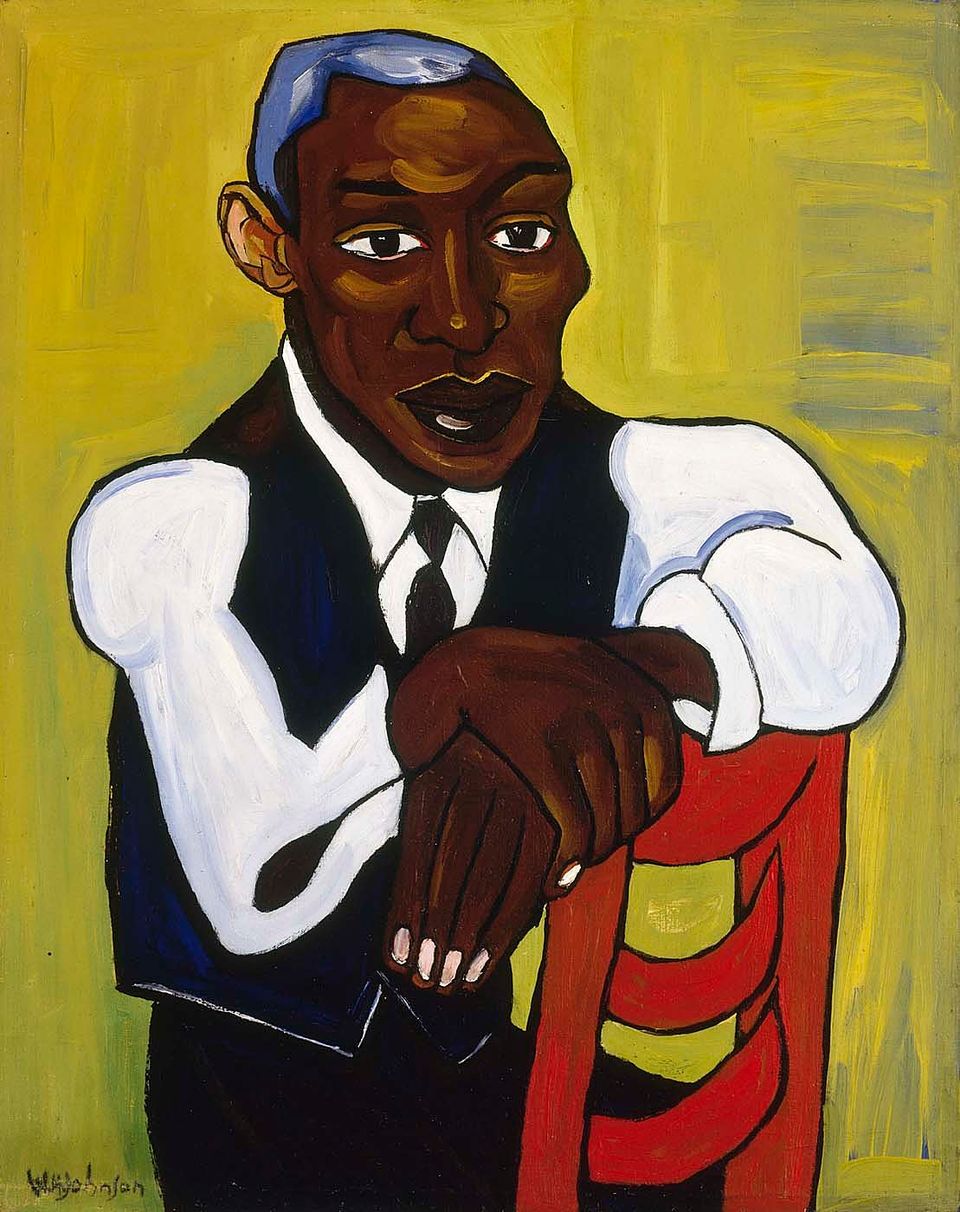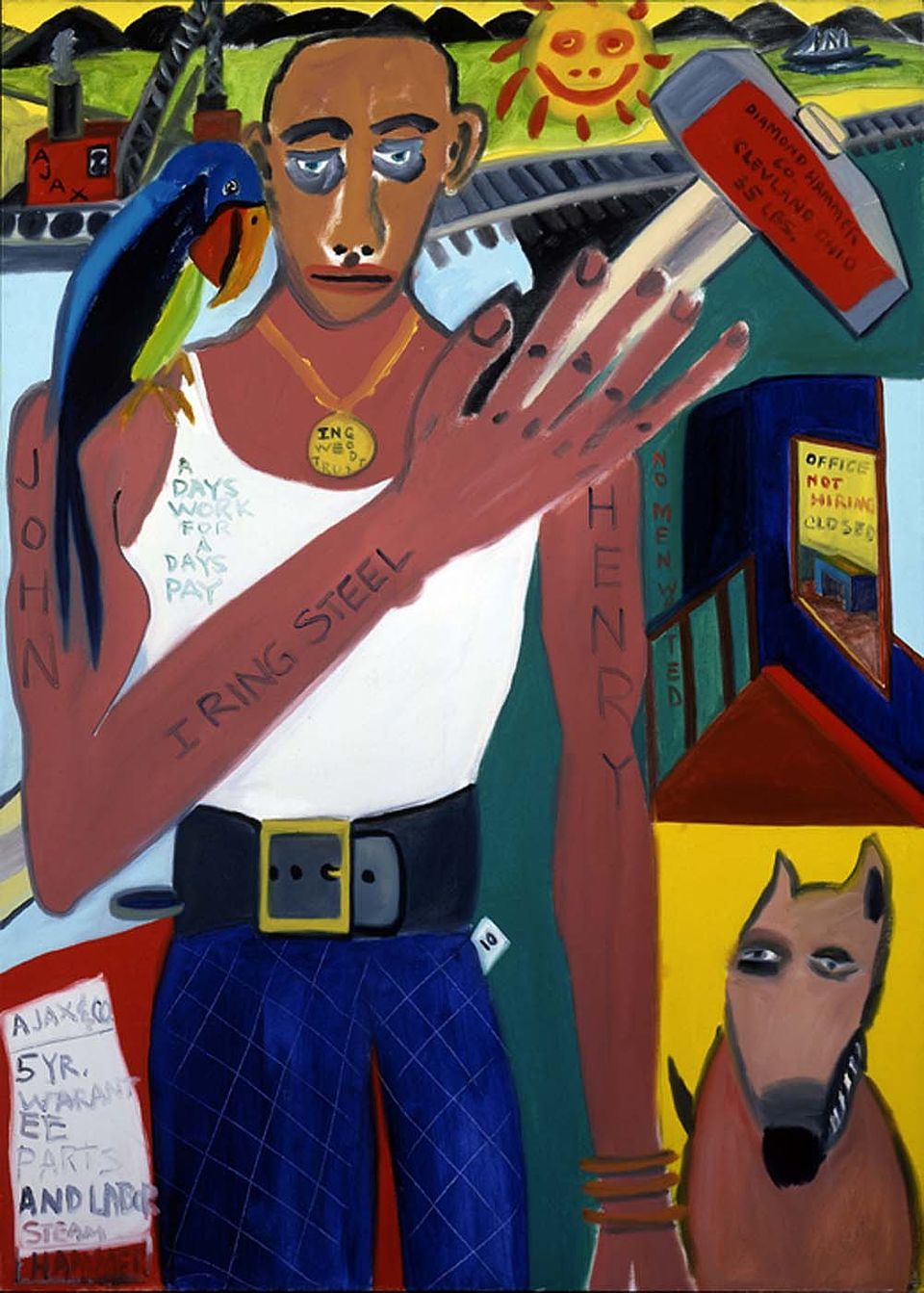Sam Gilliam
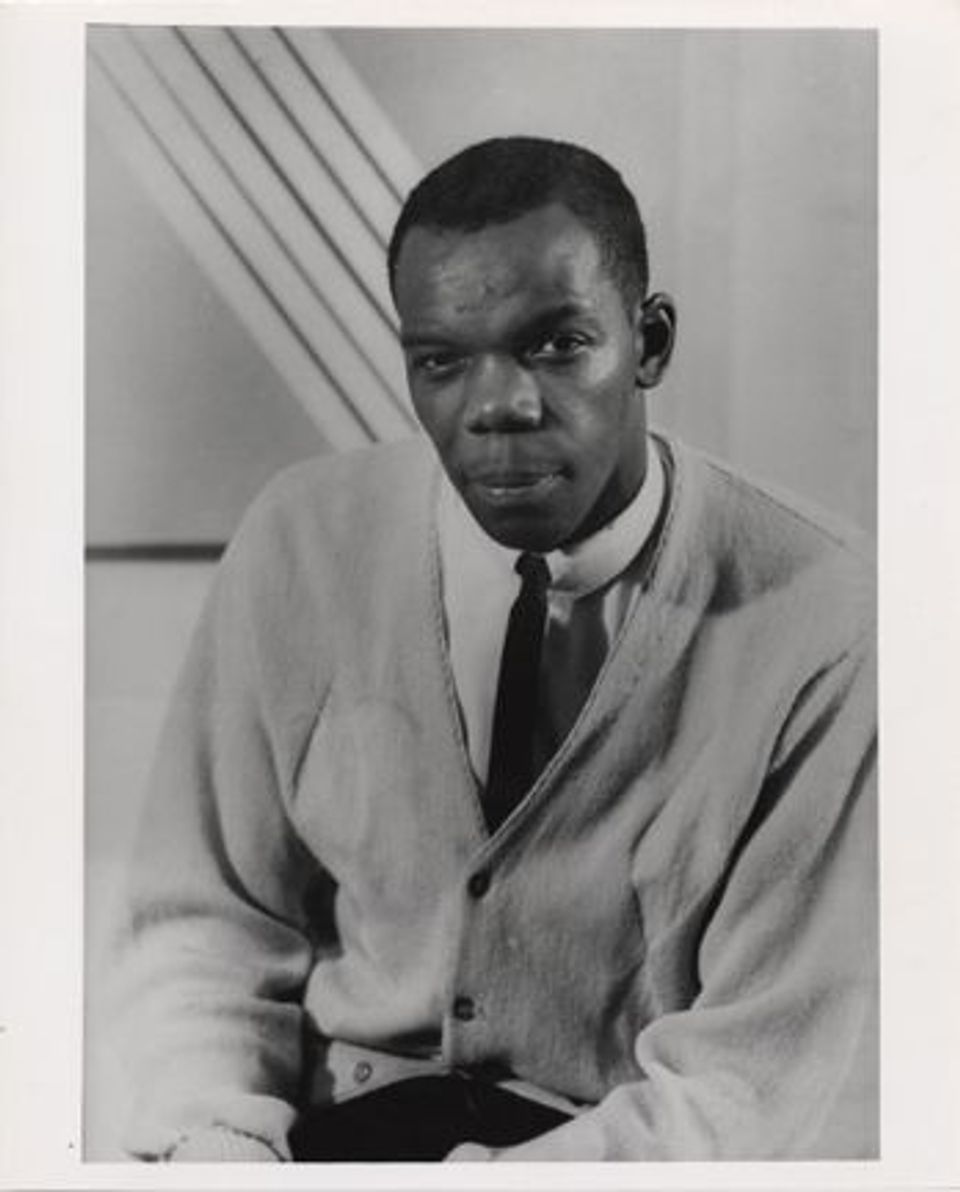
- Born
- Tupelo, Mississippi, United States
- Died
- Washington, District of Columbia, United States
- Active in
- Washington, District of Columbia, United States
- Biography
Gilliam is an innovative color field painter who has advanced the inventions associated with the Washington Color School. During the late 1970s, Sam Gilliam discovered that by cutting and rearranging geometric shapes from thickly painted canvases, he could expand his experiments in color and improvisation. The shifting irregular patterns in these randomly patterned canvases resemble those found in African American "crazy quilts." His large scale installations in metro stations and airports are as stimulating as his studio pieces.
Gwen Everett African American Masters: Highlights from the Smithsonian American Art Museum (Washington, D.C. and New York: Smithsonian American Art Museum in association with Harry N. Abrams, Inc., 2003)
- Artist Biography
"I am a better artist today in that I am obviously a better teacher. Whether I am teaching or making art, the process is fundamentally the same: I am creating." — Sam Gilliam quoted in Curtia James, "Working With His Seven League Boots On," American Visions 4:1 (Feb. 1989): 27.
For the past twenty five years, Sam Gilliam has been internationally recognized as the foremost contemporary African American Color Field painter. He is most widely known for the large color stained canvases he draped and suspended from walls and ceilings during the late 1960s and early 1970s. Since that time Gilliam's style has undergone a number of phases, and he continues to explore new avenues of artistic expression.
Born in Tupelo, Mississippi, in 1933, Gilliam was the seventh of eight children of Sam and Estery Gilliam. Shortly after his birth, the Gilliams moved to Louisville, Kentucky, where the artist spent his childhood. Gilliam's father worked on the railroad, and his mother was a homemaker for the large family. Gilliam began painting by the time he was in elementary school, and recalls important encouragement from his fifth grade art teacher and a special art program at Louisville's Madison Junior High School. In 1951 Gilliam graduated from Central High School in Louisville. He attended the University of Louisville and graduated with a bachelor of arts degree in fine arts in 1955. During that same year he enrolled in graduate school at the University of Louisville, and also had his first solo exhibition at the same institution. Gilliam served in the United States Army from 1956 to 1958. He returned to Louisville following his discharge, and completed his master of arts degree in fine arts at the University of Louisville in 1961.
Gilliam initially taught art for a year in the Louisville publischools. In 1962 he married Dorothy Butler, a Louisville native and a well known journalist. That same year, Gilliam moved to Washington, D.C., where he has lived ever since.
The background for Gilliam's art was the 1950s, which witnessed the emergence of abstract expressionism and the New York School followed by Field Painting. Although these developments were later to play major roles in Gilliam's style, he had no direct exposure to these movements during his years at the University of Louisville. His teachers in Louisville were influenced more by the emotionally charged art of the German Expressionists of the first half of thiscentury. Gilliam's paintings and drawings from graduate school in the late 1950s until his first one man exhibition in Washington in 1963 were primarily figural abstractions employing bold, dark colors of a brooding nature reminiscent of the works of German Expressionist Emil Nolde. An important contemporary influence whom Gilliam acknowledges during that period was Nathan Oliveira, a California figurative expressionist who held an exhibition in Louisville. Two other early influences were the fluidly luminous watercolors of Paul Klee, and the works of the German Expressionist group Die Brücke (The Bridge).
Although not an organized or self conscious movement, one of the most important developments in abstract art to emerge following abstract expressionism occurred in Washington, D.C., and is most often designated the Washington Color School. Artists identified with this movement include Morris Louis, Kenneth Noland, Thomas Downing, Paul Reed, Anne Truitt,and Gene Davis. The general course of this style developed from the more painterly abstractions of the 1950s to totally nonrepresentational, expansive, simplified works of clear bright colors through the 1960s. Morris Louis had died and Kenneth Noland had moved to New York by the time Gilliam arrived in Washington in 1962. Their works were well known in Washington, however, and in 1963 Gilliam met Thomas Downing who introduced him to Washington's realm of color art. At that point Gilliam decided to relinquish his earlier, brooding style in favor of nonrepresentational art. His earliest Washington works were large, clean edged paintings with flatly applied areas of color within the stylistic idiom of Washington Color Field Painting. Following that phase, Gilliam created early abstractions of diagonal stripes on square fields. During this time Gilliam experimented by taping and pouring colors, folding and staining canvases, and literally folding a still wet canvas against itself to imprint vertical, angular, and axial forms.
Around 1965 Gilliam became the first painter to introduce the idea of the unsupported canvas. Partially inspired by women hanging laundry on clotheslines he observed from the window of his Washington studio, Gilliam abandoned the frame and stretcher, and began to drape and suspend large areas of paint stained canvas. This innovative and improvisational technique was phenomenally successful and of widespread influence. Gilliam received numerous public and private commissions for his draped canvases, earning him the title "father of the draped canvas." These paintings were sometimes suspended from ceilings, arranged on walls, or on floors. They represent a third dimension in painting, and impart a sculptural quality. Though installed by the artist, Gilliam's draped canvases could be rearranged at will, and he has frequently embellished these works with metal, rocks, and wooden beams. One of the largest and final works of Gilliam's "draped" series was Seahorses of 1975 for the Philadelphia Museum of Art. This six part work involved several hundred feet of paint stained canvas, and was commissioned for the exterior walls of two adjacent wings of the museum.
While at the height of his popularity as the creator of draped canvases, in 1975, Gilliam suddenly discontinued producing them and began creating dynamic geometric collages influenced by musicians Miles Davis and John Coltrane. By 1977 Gilliam was producing "Black Paintings", similar in technique to the collage paintings, but in predominantly black hues. In 1979 Gilliam's Wild Goose Chase series was inaugurated and featured slanted edges and designs reminiscent of quilt patterns.Gilliam's method of paint application changed dramatically during the 1980s. His former technique of staining and saturating wet canvases was replaced by a method in which multiple layers of thick acrylic paint and gels are scumbled, spattered, and built up on the canvas in a rich impasto. Gilliam's "quilted" paintings of the 1980s involved cutting geometric shapes from his thickly encrusted canvas surfaces, and rearranging them on nylon or canvas backgrounds in patterns reminiscent of African American patchwork quilts the artist remembered from his childhood.
Gilliam's most recent works are textured paintings that incorporate or arejuxtaposed with metal forms. A noted series of this type was the D series that appeared in a one man exhibition at the Corcoran Gallery of Art in 1983 and employed a metal D shaped form at the bottom of each painting. Gilliam continues to produce new series, employs enamel as well as acrylic paints, and uses canvas, nylon, and awning materials in conjunction with aluminum and other metals. Gilliam's ability to move beyond the aesthetic of Washington Color Field Painting has assured his prominence as an exciting and innovative contemporary painter.
An outstanding creator of public art, Gilliam frequently works on a monumental scale and has received numerous major public commissions around the country. He is also one of the few successful, self supporting African American artists who views the teaching of art as a mission. His love of teaching developed during the one year he spent in the Louisville public schools. He taught for nearly a decade in the Washington public schools, and then at the Maryland Institute, College of Art and the University of Maryland, and for several years at Carnegie Mellon University in Pittsburgh. In addition, Gilliam still devotes time to conducting workshops, articipating in panels, and delivering lectures in this country and abroad. He is an eloquent and articulate spokesman for his work. Gilliam has received two National Endowment for the Arts awards, fellowships from the Washington Gallery of Modern Art and the Guggenheim Foundation, and an Honorary Doctorate of Humane Letters from his alma mater, the University of Louisville, in 1980.
Regenia A. Perry Free within Ourselves: African American Artists in the Collection of the National Museum of American Art (Washington, D.C.: National Museum of American Art in Association with Pomegranate Art Books, 1992)
Luce Artist BiographySam Gilliam grew up in Tupelo, Mississippi, and studied art in Louisville, Kentucky. In 1962 he moved to Washington, D.C., and created abstract paintings inspired by the Washington Color School artists Morris Louis and Kenneth Noland. These artists, among others, broke the rules of abstract expressionism by pouring thinned paint directly onto unprimed canvas instead of applying thick, vigorous brushstrokes. Gilliam pushed this method even further by folding and draping the canvas before it dried, creating unusual “tie dye” effects. He started working with very large canvases in the late 1960s, hanging vast pieces of painted cloth across walls and ceilings to emphasize the relationship between the work and its environment.
Videos
Exhibitions
Related Posts
